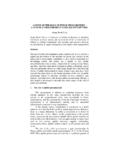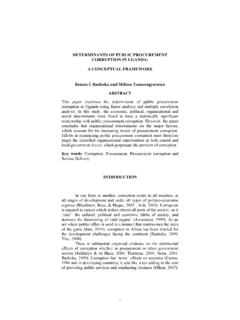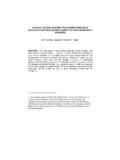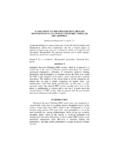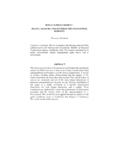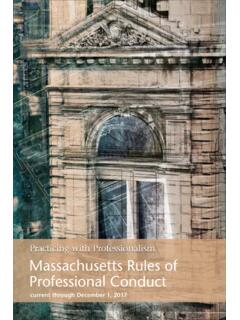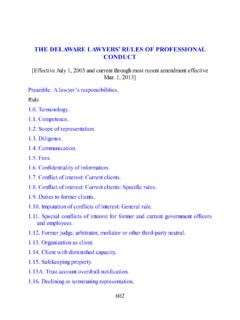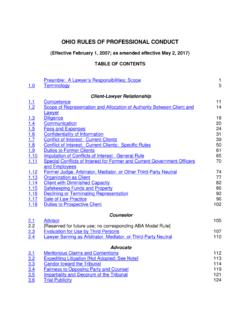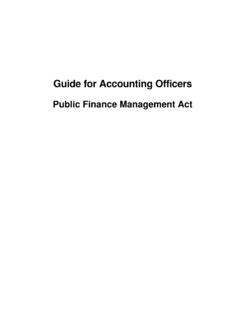Transcription of WHAT IS PUBLIC PROCUREMENT? DEFINITIONAL PROBLEMS …
1 INTERNATIONAL PUBLIC PROCUREMENT CONFERENCE PROCEEDINGS, VOLUME 3 2004 WHAT IS PUBLIC PROCUREMENT? DEFINITIONAL PROBLEMS AND implications Robert E. Lloyd and Clifford P. McCue* ABSTRACT. At all levels of government, inconsistencies exist regarding the body of knowledge and terminology used to define PUBLIC procurement. Perspectives on what PUBLIC procurement is or should be vary from routine ordering to sophisticated analysis of government spending. DEFINITIONAL ambiguity has hampered attempts to define the field and unify its focus. This exploratory article examines the implications of the range of definitions that has led to debate and uncertainty about the proper role of PUBLIC procurement professionals. The lack of clarity in PUBLIC procurement challenges the profession as it seeks to enhance its competency and expand its influence beyond traditional control oriented roles.
2 INTRODUCTION Is PUBLIC procurement a profession? To many practitioners and academics, the question remains unanswered. Does it really matter weather a government employee is called a purchasing agent, buyer, or procurement professional? Why is it so critical to have an agreed upon PUBLIC procurement body of knowledge (PPBOK), when all these individuals do is buy things? Aren t these matters for academic pursuit rather than substantive discourse about what these individuals do in organizations, and how through professionalization these individuals could significantly enhance the allocation of resources in government? Unfortunately, without an agreed upon body of knowledge, the development of education and training programs will result in further degradation of the field. According to Gargan (1993), a body of knowledge is a conceptual framework that is systematized about a central ------------------------ * Clifford P.
3 McCue, , is an Associate Professor, School of PUBLIC Administration, Florida Atlantic University. His research interest is in PUBLIC finance, budgeting, and procurement. Robert E. Lloyd, CPCM, is Director, Policy Division, Office of the Procurement Executive, Department of State. His research interest is PUBLIC procurement economics and human factors; the views are solely the authors and do not necessarily represent those of the Government. 2 LLOYD & MCCUE theme and formulated through the process of definition, classification, and analysis with reference to the discovery of general concepts, theories, laws and/or principles. A first step in identifying a body of knowledge for the procurement profession is to address the conceptual ambiguity of defining PUBLIC procurement. If the procurement field cannot define itself, individuals outside the field will create their own ill-informed, ill-fitting definitions of PUBLIC procurement.
4 For example, imagine the definition of PUBLIC procurement potentially considered by a human resource manager. The human resource manager would probably think about the most common tasks that procurement professionals perform on the job. From this perspective, these tasks may include gathering information about the buy from various suppliers, investigating the suitability of various suppliers, making sure that the supplies are delivered, checking to insure that what was ordered was actually received, and disposing of all used supplies. When private individuals or corporations buy things, they may use various terms, such as purchasing or buying, to describe their actions. In government organizations, many different terms are used when referring to the buying function, from PUBLIC procurement to purchasing, contracting, or acquisition, and many other variations.
5 The wide variety of terms becomes a concern when there are DEFINITIONAL ambiguities, as now permeate the practice and profession. This problem appears to be more acute in the buying field than elsewhere. For example, someone who practices economics is invariably called an economist, whether in the PUBLIC or private sector. Other fields, such as finance, tend to use well-defined and consistent terminology and definitions, typified by the near-universal acceptance of the term Chief Financial Officer across both the PUBLIC and private sectors. Clarity in what practitioners and scholars mean when they refer to PUBLIC procurement is lacking. This paper seeks to offer an exploratory review of the array of definitions found in the field and to assess the implications of this DEFINITIONAL uncertainty for the profession.
6 We will attempt to frame the debate on the fundamental issue of what PUBLIC procurement means in theory and in practice. It is safe to say that a profession which cannot clearly define itself risks not only being misunderstood but potentially losing it focus for practitioners. WHAT IS PUBLIC PROCUREMENT? DEFINITIONAL PROBLEMS AND implications 3 Smith and Lynch (2003, p. 35) suggest that terms can be defined in two ways: by relying on common usage or by creating a definition for intellectual or conceptual purposes. We will consider both methods as we review the literature and current practices in an effort to provide a baseline of common understanding. LEGAL DEFINITIONS PUBLIC procurement is one of the most highly legislated and regulated fields of government. In the , legislation on this subject dates back to 1777 (Nagle 1999, p.)
7 19). As a result, no survey of PUBLIC procurement definitions would be complete without a review of the laws and regulations governing its conduct. Federal Government In 1984, the Government converted to a new system of regulations governing how Federal agencies buy things. The former Federal Procurement Regulations and Defense Acquisition Regulation (which was known as the Armed Services Procurement Regulation until 1976), along with the NASA Procurement Regulation, were combined into a new set of rules called the Federal Acquisition Regulation (FAR). There was a deliberate attempt to replace the term procurement with acquisition, in part to distinguish the new rules from the old, as noted in the following excerpt from the FAR (Section , Definitions): "Acquisition" means the acquiring by contract with appropriated funds of supplies or services (including construction) by and for the use of the Federal Government through purchase or lease, whether the supplies or services are already in existence or must be created, developed, demonstrated, and evaluated.
8 Acquisition begins at the point when agency needs are established and includes the description of requirements to satisfy agency needs, solicitation and selection of sources, award of contracts, contract financing, contract performance, contract administration, and those technical and management functions directly related to the process of fulfilling agency needs by contract. "Procurement" (see "acquisition"). Although the term procurement has generally fallen into disfavor at the Federal level, it still persists in several forms. For example, the office responsible for Government-wide policy remains the Office 4 LLOYD & MCCUE of Federal Procurement Policy, the job series for buyers is referred to as Contracting ( Office of Personnel Management 1983), most policy professionals in the field hold the job title of Procurement Analyst, and no initiatives are underway to change the term (Lloyd 2000).
9 At the Federal level, Congress in 2003 enacted legislation that defines in detail what acquisition means. In the past, the operative term was procurement , which was defined in 41 403(2) as follows: The term 'procurement includes all stages of the process of acquiring property or services, beginning with the process for determining a need for property or services and ending with contract completion and closeout. But in 2003, Congress passed the Services Acquisition Reform Act (SARA), stating: The term `acquisition' `(A) means the process of acquiring, with appropriated funds, by contract for purchase or lease, property or services (including construction) that support the missions and goals of an executive agency, from the point at which the requirements of the executive agency are established in consultation with the chief acquisition officer of the executive agency; and `(B) includes `(i) the process of acquiring property or services that are already in existence, or that must be created, developed, demonstrated, and evaluated; `(ii) the description of requirements to satisfy agency needs; `(iii) solicitation and selection of sources; `(iv) award of contracts; `(v) contract performance; `(vi) contract financing.
10 `(vii) management and measurement of contract performance through final delivery and payment; and WHAT IS PUBLIC PROCUREMENT? DEFINITIONAL PROBLEMS AND implications 5 `(viii) technical and management functions directly related to the process of fulfilling agency requirements by contract.'. Although the new definition is similar to that appearing in the FAR, by promulgating this new, more expansive definition, Congress signaled its intent to view the buying process in a broader perspective, encompassing technical and management functions. Excluded are grants and cooperative agreements, which are governed by a separate statute (31 6303) that distinguishes a procurement contract by the fact that it involves acquiring something for the direct benefit or use of the government, rather than simply providing funding to stimulate a PUBLIC purpose.
